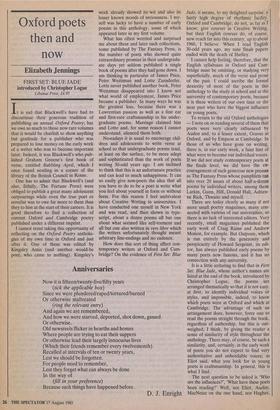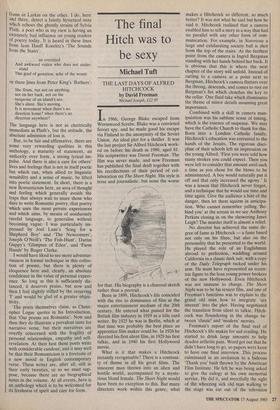Oxford poets then and now
Elizabeth Jennings
FIRST SET: BLUE JADE introduced by Christopher Logue Lthanus Press, £4.95 It is sad that Blackwell's have had to discontinue their generous tradition of publishing an annual Oxford Poetry; but we owe so much to those now rare volumes that it would be churlish to show anything but gratitude for a publisher who was prepared to lose money on the early work of a writer who was to become important later. Indeed, it was Blackwell's who pub- lished Graham Greene's first book of verse, entitled Babbling April, which I once found nestling in a corner of the library of the British Council in Rome.
One has to admit that Blackwell's (and also, fitfully, The Fortune Press) were obliged to publish a great many adolescent outpourings while even the true poet or novelist was to owe far more to them than they to him at the start of their careers. It is good therefore to find a collection of current Oxford and Cambridge poetry published under a different imprint.
I cannot resist taking this opportunity of reflecting on the Oxford Poetry antholo- gies of my own time in Oxford and just after it. One of these was edited by Kingsley Antis (and another would-be poet, who came to nothing). Kingsley's work already showed its wit and also its lesser known moods of seriousness. I my- self was lucky to have a number of early poems in this anthology, some of which appeared later in my first volume.
What has often worried and surprised me about these and later such collections, some published by The Fantasy Press, is the number of poets who showed quite extraordinary promise in their undergradu- ate days yet seldom published a single book of poems after they had gone down. I am thinking in particular of James Price, Peter Weitzman and Lotte Zurndorfer. Lotte never published another book, Peter Weitzman disappeared into I know not what world of employment, James Price became a publisher. In many ways he was the greatest loss, because there was a Lawrentian passion as well as a fine ear and first-rate craftsmanship in his under- graduate poems. Marriage claimed him and Lotte and, for some reason I cannot understand, silenced them both.
Nowadays it is usual to encourage chil- dren and adolescents to write verse at school so that undergraduate poems tend, at least on the surface, to be more adept and sophisticated than the work of poets writing 30-odd years ago. I am inclined to think that this is an unfortunate practice and can lead to much unhappiness. It can so easily give non-poets the idea that all you have to do to be a poet is write what you feel about yourself in form or without form. For this reason I feel ambivalent about Creative Writing in universities. I have conducted one myself in New York and was read, and then shown in type- script, about a dozen poems all but one about what seemed like self-torment and all but one also written in vers libre which the writers unfortunately thought meant arbitrary line-endings and no cadence.
How does this sort of thing affect con- temporary writers at Oxford and Cam- bridge? On the evidence of First Set: Blue Jade, it means, to my delighted surprise, a fairly high degree of rhythmic facility. Oxford and Cambridge, do not, as far as I know, give courses in Creative Writing, but their English courses do, of course, now reach far into this century, up to about 1960, I believe. When I read English 30-odd years ago, my nine finals papers ended with the death of Shelley.
I cannot help feeling, therefore, that the English syllabuses in Oxford and Cam- bridge must be omitting, or studying very superficially, much of the verse and prose of the past. I could ascribe the formal dexterity of most of the poets in this anthology to the study at school and at the university of contemporary poets, because it is these writers of our own time or the near past who have the biggest influence on young poets.
To return to the old Oxford anthologies — I note on re-reading several of them that poets were very clearly influenced by Auden and, to a lesser extent, Graves at Oxford, and by Empson at Cambridge. In those of us who have gone on writing, there is, in our early work, a faint hint of what were to become our individual voices.
If we did not study contemporary poets at the finals level, we did have the en- couragement of such generous new presses as The Fantasy Press whose pamphlets ran into over 20 issues of about half-a-dozen poems by individual writers, among them Larkin, Gunn, Hill, Donald Hall, Adrien- ne Rich, Thwaite and myself. There are today clearly as many if not more small poetry magazines, many con- nected with various of our universities, so there is no lack of interested editors. Very recently, small magazines published the early work of Craig Raine and Andrew Motion, for example. But Outposts, which is run entirely by the generosity and perspicacity of Howard Sergeant, its edi- tor, has always published early poems by many poets now famous, and it has no connection with any university.
It is a little irritating to find that in First Set: Blue Jade, whose author's names are listed at the end of the book, introduced by Christopher Logue, the poems are arranged thematically so that it is not easy, at first, to identify individual voices or styles, and impossible, indeed, to know which poets were at Oxford and which at Cambridge. The advantage of such an arrangement does, however, force one to read the poems straight through the book, regardless of authorship, but this is out- weighed, I think, by giving the reader a sense of similarity of style throughout the anthology. There may, of course, be such a similarity, and, certainly, in the early work of poets you do not expect to find very authoritative and unheedable voices; as Eliot said, what you look for in young poets is craftsmanship. In general, this is what I find.
The next question to be asked is 'Who are the influences?', 'What have these poets been reading?' Well, not Eliot, Auden, MacNeice on the one hand, nor Hughes, Gunn or Larkin on the other. I do, here and there, detect a faintly hysterical note which echoes the ghostly strains of Sylvia Plath, a poet who in my view is having an extremely bad influence on young readers of poetry today. It is heard in these lines from Jean Hanff Korelitz's 'The Sounds from the Stairs': an oversized And awkward visitor who does not under- stand
This grief of gestation, ache of the womb
or these lines from Peter King's 'Bathers': She floats, but not on anything, not on her back, not on the turquoise of an island's sea. She's silent. She's moving.
Is it movement when there's no direction home? when there's no direction anywhere?
The language here is not as electrically immediate as Plath's, but the attitude, the absolute admission of loss is.
But, to be fair and affirmative, there are some very rewarding qualities in this anthology, a maturity of statement, an authority over form, a strong lyrical im- pulse. And there is also a care for others' lives and feelings that is not in itself poetic but which can, when allied to linguistic sensibility and a sense of music, be lifted into poetic statement. In short, there is a new Romanticism here, an area of thought and feeling which generally avoids the traps that always wait to snare those who dare to write Romantic poetry, that poetry which uses the most private experiences and which aims, by means of assiduously careful language, to generalise without becoming vague. I was particularly im- pressed by Joel Lane's 'Song for a Shepherd Boy' and 'The Newcomers', Joseph O'Neill's 'The Fish-Hunt', Darius Guppy's 'Glimpses of Eden', and 'Farm Hands' by Roger Clarke.
I would have liked to see more adventur- ousness in formal technique in this collec- tion of poems, but there is plenty of eloquence here and, clearly, an absolute confidence in the value of personal experi- ence. So long as this is sufficiently dis- tanced, it deserves praise, but now and then I feel slightly stifled by the recurring T and would be glad of a greater obj6c- tivity.
The poets themselves claim, as Christ- opher Logue quotes in his Introduction, that 'Our poems are Romantic'. Now and then they do illustrate a prevalent taste for narrative verse, but their narratives are overtly concerned with the fragility of personal relationships, empathy and self- revelation. At their best these poets write with considerable candour, and it may well be that their Romanticism is a foretaste of a new mood in English contemporary verse. These writer are, after all, still in their early twenties, or so we must sup- pose, because there are no biographical notes in the volume. At all events, here is an anthology which is to be welcomed for its freshness of spirit and care for form.















































 Previous page
Previous page